18) Lloyd Mangrum, 1940 (1st round)
It remains one of the great opening rounds in Major golf and Lloyd Mangrum’s brilliant 64 at the 1940 Masters remained a course record for 46 years.
It is hard to imagine playing that kind of event while Europe was at war and Mangrum would earn two Purple Hearts and four battle stars, spending six months in hospital after being shot in both legs.
He would return to the USA and win the 1946 US Open, finally claiming a Major title that looked his for the taking six years earlier.
Mangrum registered nine birdies as he broke the course record by two shots but, in the final reckoning, would finish second to the popular Jimmy Demaret. A second round 75 cost him dear and the champion would finish four clear in the final reckoning.
Lloyd Mangrum invaded at D-Day, fought at the Battle of the Bulge and held the Augusta National course record for 46 years. #themasters pic.twitter.com/Xz2kquHq7i
— The Masters (@TheMasters) November 11, 2020
17) Gene Sarazen, 1935 (4th)
It was the round of golf that made The Masters famous. Gene Sarazen’s closing 70 got him into a play-off with Craig Wood, a prospect that looked highly unlikely as he stood on the 15th tee.
What followed over the next ten minutes transformed Sarazen’s life as he pulled off the ‘shot that was heard around the world’, holing his second at the legendary par five.
Wood also finished strongly and birdied the last to earn himself a 36-hole play-off opportunity but Sarazen was just too strong, finishing five shots clear of his rival on the Monday.

Related: Augusta’s ultimate hideaway? Head to the Crow’s Nest!
16) Bob Goalby, 1968 (4th)
It was the Masters that became infamous for the most unfortunate scorecard error in the history of golf. Roberto De Vicenzo signed for a four on the 17th when he had, in fact, birdied it.
Had De Vicenzo’s playing partner Tommy Aaron not made the mistake, he would have been in a play-off with the champion Bob Goalby.
But that is to take nothing away from the achievements of the 1968 Green Jacket winner who finished on 11 under thanks to a closing 66.
Goalby birdied 13 and 14 before eagling 15 to take a one-shot lead he would never lose as fate conspired to favour the American.
15) Nick Faldo 1989, (4th)
While the 1989 Masters is famous for the tiddler that Scott Hoch missed, the groundwork for Nick Faldo’s first Masters victory was laid hours before.
The competition was a famously wet affair and a third-round 77 left the lofty Englishman five back of Ben Crenshaw.
Faldo changed his putter ahead of the final round and holed a 40-foot bomb at the first to ignite his challenge. He turned in 32.
There would be a bogey on 11 but the three-time Masters champion also birdied 13, 14, 16 and 17 to post a score none of those behind him could eclipse.
Hoch and Crenshaw both had great chances to overhaul the long-time clubhouse leader, especially the former, who led with two to go and then missed from two feet at the first play-off hole. Faldo made him pay by sinking a 30-footer at the next (11).
14) Doug Ford 1957 (4th)
The redoubtable Doug Ford was 95 when he passed away in 2018. The American played in 49 Masters, a fact made possible by his sensational victory in 1957.
Playing the last, Ford could afford to bogey and still win having surged into the lead with birdies at 12, 14 and 15.
However his approach shot at 18 plugged in the bunker and suddenly his closest challenger Sam Snead was back in the title picture.
However Ford quickly shut the door on that prospect by holing out for a birdie to finish with a memorable 66.
13) Greg Norman 1996, (1st)
When Greg Norman was in the mood he was a force of golfing nature. At the 1988 Open at Troon he birdied the first six holes to power his way into contention on the final day. His 64 in the final round of 1993 Open at Royal St George’s remains one of the greatest rounds of golf ever played. The blustery conditions proved too much for most of the field but Norman just elevated himself to another level.
Off the tee he had few peers and his driving advantage meant he could follow his attacking instincts by attacking pins with short irons while most of his peers would need two or three clubs more.
All that talent and fearlessness combined to extraordinary effect in the first round of the 1996 Masters as the Aussie birdied nine of the final 12 holes. The conditions were conducive – Phil Mickelson opened with a 64 – but to shoot 63 at Augusta puts you in a very special club. Only Nick Price (1986) had matched that score.
